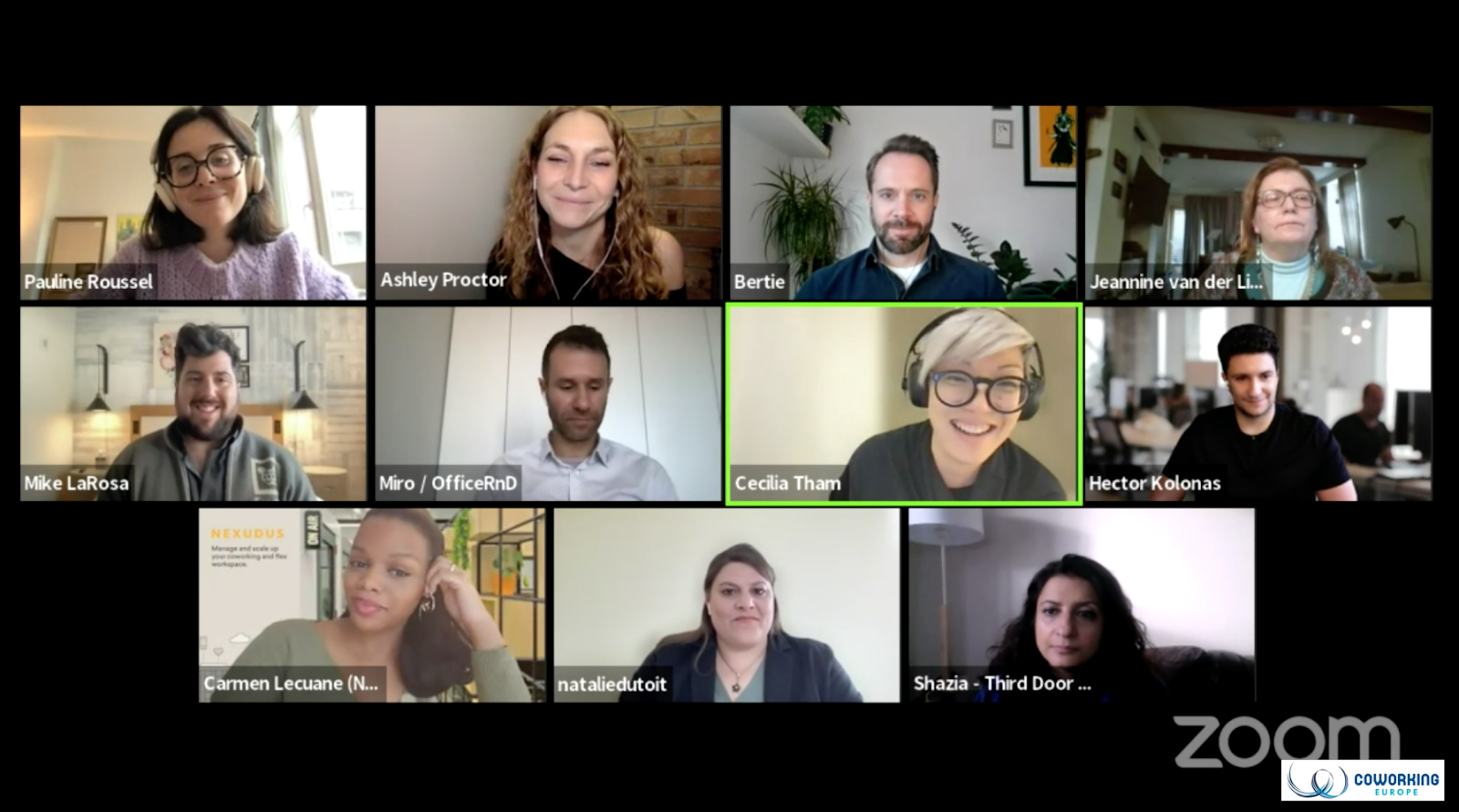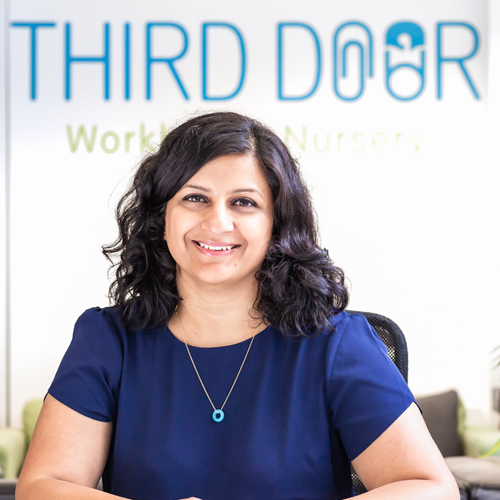What does IDEA stand for and why is it so important in coworking?
With the rapid (or slow) administration of the different COVID-19 This year, Coworking Europe took place on the virtual stage between December 1-3. Learn How To Transform Diversity And Inclusion Into A Driver Of Growth was free for anyone to join and it's still available to watch on coworkingidea.org. Check it out.
Alongside lots of other industry guests, Nexudus’ very own Carmen Lecuane joined hosts Jeannine van der Linden and Ashley Proctor to explore how coworking spaces can achieve inclusion, diversity, equity and accessibility.

Carmen Lecuane (bottom left) is Nexudus’ International Inbound Software Specialist.
What does IDEA stand for?
The Coworking IDEA Project is a movement made up of coworking operators, companies, consultants and community organisers, all of whom are dedicated to making our sector more inclusive, diverse, equitable and accessible (IDEA).
“We believe that by working collaboratively internationally, we can have a ripple effect throughout the industry and that our individual actions really matter,” says the webinar’s co-host Ashley Proctor.
“We each have the opportunity to make decisions in our businesses, organisations, and communities and we also often have the platform and access to a larger network where we can influence [others] by changing our behaviour and leading by example.”
If you’re interested in joining the project or if you just want to make your workspace more IDEA, why not take part in the project’s monthly challenges?
Each challenge is designed to help coworking organisations enact change. This month’s challenge is to watch the IDEA panel discussion at Coworking Europe 2021.
What did the experts say?
Panellists joined the discussion from all over the world. First up was Cecilia Tham, who founded Makers of Barcelona. The space is credited with being one of Barcelona’s first large-scale coworking communities.
Tham emphasised how crucial it is for organisations to take a proactive approach to IDEA instead of just reacting when - and if - an issue arises.
“Unfortunately, a lot of these issues aren't dealt with until there’s a problem or crisis, and by then it’s way too late… I would like to see that we’re more intentional in terms of handling IDEA on a preparational basis,” says Tham.
In 2013, Hector Kolonas opened coworking spaces in old advertising agencies in Cyprus. While doing this, he came to the realisation that “coworking communities have this huge power to change the neighbourhoods they’re in.”
He’s noticed that organisations are finally starting to think more proactively. For example, a growing number of operators are starting to identify “opportunities [for connecting] to people within our neighbourhoods who might not feel represented in our spaces.”
“I’m really excited to see spaces that are looking at new ways to reach into local community hubs that don’t traditionally use coworking or haven’t engaged with coworking spaces much in the past, and start those conversations.”
For tips on how to engage with the wider community, check out this article we published in September, which was inspired by a London Coworking Assembly event.
Miro Miroslavov, the CEO and co-founder of OfficeRnD, recommends that companies - coworking or otherwise - prioritise IDEA from the beginning of their journey.
“Do it early in the business’ lifecycle. When you start scaling up it’s easy to slip into the wrong direction [and] start losing ground…if you don’t educate people” on what IDEA means it’s a really dangerous position to be in.”
Have you read the book Around the world in 250 coworking spaces yet? If not, we’d suggest ordering a copy today! It explores the triumphs and challenges experienced by coworking operators in different countries and details how they’re coping during the pandemic.
Pauline Roussel is the co-founder of Coworkies, who published the book. She says it’s important to get a clear understanding of what the words inclusive, diverse, equitable, and accessible actually mean. Not everyone knows that “each term is very different.”
Roussel thinks an IDEA framework or set of standards for the coworking sector would be very useful because it would help people measure how well they’re performing in each area.
Our International Inbound Software Specialist, Carmen Lecuane, agrees that a shared framework would be a “huge achievement for the industry.”
“Internally and externally [at Nexudus] we’ve tried our best to implement a framework,” she adds. When it comes to IDEA, Nexudus prioritises workplace behaviour and communication and makes sure that every decision-making panel is diverse."
It’s time to practice what we preach
Alex Ahom, Director at the European Coworking Assembly and workplace consultant, says the time for putting words into action is long overdue. “It’s great to see this topic on the main stage [at conferences] but we can’t fall into the trap of thinking that talk is enough.
“In the D&I world, organisations spend a lot of time talking and maybe trying to move towards action in diversity. But diversity isn’t enough - we must move forward to inclusion, equitability, sustainability. When is it time for transparency and accountability?”
Like Nexudus’ Lecuane, Ahom also recognises the importance of diversity in decision-making. In the webinar, he shares an anecdote about when a company sought help to make their firm better for women, but the decision-making panel were all men.
“They felt they were all open-minded…and it wasn’t a problem. But that is the issue: you have people who don’t believe they’re the problem talking about a topic that they don’t have an experience in.” Fortunately, they implemented changes and behaviours shifted.
The coworking panellists were also joined by Paralympic Gold Medallist, Natalie du Toit. As well as working in digital marketing, she’s a motivational speaker and has taken part in various South African, African and international athletes’ commissions.
In her experience travelling the world, Du Toit has learned different regions have different barriers to inclusion, diversity, equitability, and accessibility. That’s why it's so important to listen to people, learn about different cultures and collaborate.
“In every region, [IDEA] will mean something different to the people who come into your workspaces. In our case, it was about classification in sport. Some people were voicing concerns that there are some disabilities that are in classes that shouldn’t be. Include everyone in the conversation in some shape or form.”
Start small if you need to
Roussel acknowledges that some coworking companies might feel like IDEA is too big a challenge to tackle. But, as she points out, there are small things you can do to start the wheels turning that can end up making a huge impact.
If you know you need to do more but don’t know where to start, why not ask your local Coworking Assembly for support? They might be able to point you in the direction of another operator who’s doing great things in inclusion, diversity, equitability and accessibility.
You can also check out Herman Miller’s A Better World report for some tips. Bertie van Wyk, a workspace specialist from MillerKnoll explains that the report contains plenty of insights and ideas for how to become a more equitable and inclusive workplace.
“Things like committing some of your spend to diverse-owned organisations and groups.”
Again, what starts out as a small project could transform into something life-changing for the people who engage with it. After noticing how underrepresented women were in tech, Tham launched a tech boot camp for women with a co-founder.
“Now we’re one of the largest women in tech communities in Europe: we’re training 200 women per year in machine learning and data analytics and we’re launching quantum soon!”
Inclusive design really matters
Shazia Mustafa is the co-founder of Third Door which was the world’s first coworking space with full childcare “My interest also lies in the intersectionality of the different groups,” she says. You've got working parents, but how do we attract more people from underrepresented groups?”
Mustafa says workspace design needs to be inclusive and operators need to understand that, for example, women react to temperature differently to men.
“In the book Invisible Women, Caroline Criado Perez talks about the gender data gap and how offices aren’t catered towards women.
“Have working mums got a space where they can go if they need to pump milk or breastfeed? Then if we’re looking further into intersectionality, is there a prayer room that’s clearly marked that members can go to without asking?”

Third Door was the world’s first coworking space with full childcare.
Kolonas agrees. “Are hygiene products in every bathroom? Are baby changing facilities in both male and female toilets?”
Meanwhile, Van Wyk suggests that architects and interior designers focus on “designing for the edges.” Some design for the “middle ground” and “try to accommodate the edges”, but inclusivity is about designing for the edges to ensure that “everyone gets a fantastic experience.”
Provide variety and choice so that people can adapt, say, the temperature, lighting and level of privacy to suit their own needs and requirements. “We feel before we think. Our senses subconsciously read the world around us.”
Owing to the book, Roussel has experienced lots of coworking spaces in different countries. When it comes to inclusive design, she remembers Kwerk in Paris.
At Kwerk, new members meet with an ergotherapist who takes their measurements and analyses how they work, sit, and stand. They use this information to recommend the best chair, table, and position in the coworking space for the individual’s needs.
Lecuane highlights the role virtual spaces have to play in inclusive design too. Is your website easy to navigate and understand? Are a diverse variety of people represented? Perhaps it’s time to go back to the drawing board and make some changes.
It’s coworking’s time to shine
“Coworking’s time has come,” explains Mike LaRosa, Director of Channel Partnerships at Upflex. Organisations across the board are choosing flexible workspaces according to how inclusive, diverse, equitable and accessible they are.
“The business piece is very simple: if you don’t have an element that provides a welcoming safe space, you’re not going to be considered. Corporate America now knows that it has to follow certain minimums that their employees and customers expect of them.”
“Coworking is part of the answer to building an equitable experience for everyone…and coworking is an answer for many corporates for creating a better equitable experience for their employees,'' adds van Wyk as the webinar draws to a close.
Co-host van der Linden concludes: “we need to be intentional, proactive and we must do this together.” At Nexudus, we couldn't agree more!
Want to learn more? Check out these upcoming future of work events for 2022.

